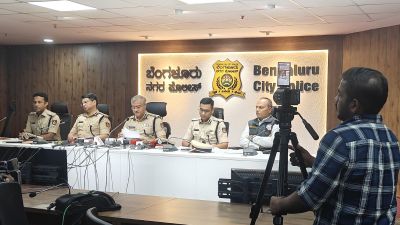Globalisation is a legacy we inherited, it has its own momentum now’
Dr Murli Manohar Joshi was the BJP's first choice for the post of Union Home Minister when the party first came to power in June 1996. He ...

Dr Murli Manohar Joshi was the BJP’s first choice for the post of Union Home Minister when the party first came to power in June 1996. He was also among the BJP’s trimurti, including Atal Behari Vajpayee and L.K. Advani, in taking vital decisions. Lately, Joshi has been maintaining a low profile, quietly carrying out his work in the Human Resources Development Ministry. HARISH GUPTA interviewed him before he left for New York to represent India at the International Women’s Conference. Excerpts:
You were Home Minister in the first Vajpayee Government. Why were you later shifted to HRD?
This is the Prime Minister’s prerogative. I neither asked for Home nor did I seek HRD. No department is big or small. There is a lot of work in the HRD ministry, a great deal of which involves dealing directly with people. Then, I’m also in charge of science and technology and ocean development, all of which are equivalent to the work of many ministries.
You are perhaps the only BJP chief to not be given a second term, whereas the party amended its constitution to provide a second term to the present incumbent.
I don’t consider that very important. The party’s decisions are taken after evolving a consensus. At that time, the consensus was in favour of making Advani president again. I never demanded the post, it was the party that gave it to me. And it was the party that wanted it to be given to Advaniji.
There is a feeling that after coming to power, there is a tendency in your party to campaign against those who are successful in their ministries.
Sometimes, that is because of lack of proper information and at times because of jealously. On certain occasions, it is prompted by vested interests. This is but natural in power politics, one must be careful.
Has your Government been able to meet the aspirations of the people?
The mandate is for five years. We have been able to deliver in some areas. This is not a one-party rule but a coalition, and coalitions have their own dynamics. We have given a stable government. No coalition in the past has been able to survive. Pokharan-II, Kargil and managing the economy under the circumstances are major achievements.
But have you been able to provide a Government that is different from the previous one?
Well, we have taken hard decisions and stuck to them. But our abilities lie within the parameters of the National Democratic Alliance (NDA). Had it been a single party government, it would have been different.
But are you not compromising on economic and other policies merely to sustain a government?
We are in the NDA. We are an alliance. We have an agenda.
How do you justify a Rs 1,200-crore bonanza by a minister merely because this is a coalition?
The Prime Minister is seized of the matter and a solution will come out of it. Ministers should also remember before announcing policies that this is an NDA government.
But where is the work culture? Where is the discipline in governance?
The work culture has changed in some ministries; in others, it is slowly changing. But as I said, this is the NDA and it will take time to evolve a new culture. It cannot be done overnight.
On economic policies, isn’t a study on the impact of reforms is necessary before accelerating the process of 1991?
A study must be undertaken. Because if you introduce reforms, their fall-out must be studied carefully and correctives applied. But the reforms are only a recent phenomenon.
The reform process has been on for 10 years.
I am talking about our government’s tenure of two years.
Despite no study, your government seems to be speeding ahead with reforms.
This is the result of the legacy we have inherited. The speed which was already there now has its own momentum.
But aren’t there are two views within your party, the Government and the NDA on globalisation?
Once you are part of an alliance, you cannot change it. Globalisation is a legacy of the past.
There seems to be competition within your party to go global. Some leaders are even saying that swadeshi does not mean being anti-MNC.
(Laughs). Well, a person is free to change his views. I can’t say anything about this. I don’t know whom you are referring to.
Some people in your party say you are the only hope left for upholding the RSS hardline.
I don’t agree with that. The whole party is there Vajpayeeji is there, Advani is there.
But they are going faster down the path than suggested. You seem the only Swadeshiwala left.
But even I’m comfortable with those who want speedier implementation of science and technology are also comfortable with me. I am taking Sankhya Vahini (Information Technology) forward with great speed.
You’re referring to technology. I am talking of consumerism.
You see, once you accept the WTO, you have to work within the system and seen how you can protect your national interests. Today the debate is confined to this. Tomorrow, I can’t predict what the situation would be. But the WTO is a reality. The debate should be whether the WTO is a just or unjust system.
What do you feel?
I believe the WTO is not a just system.
India has the option to withdraw.
It is debatable, whether withdrawal would be useful or not.
What steps are you taking to study the impact of reforms and WTO?
The Commerce ministry fought at the WTO forum. And the Finance Ministry has to conduct a study.
Are you persuading them to do so?
This is a national requirement. I think they will respond.
You are appointing a lot of Leftists in universities. Is it to rebut the charge of saffronisation?
I do whatever I think is correct. Some people have coloured glasses.
What time-frame do you envisage for the education-to-all programme ?
I hope to achieve the target by 2003.



- 01
- 02
- 03
- 04
- 05




























